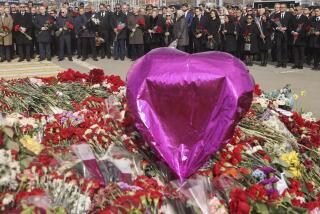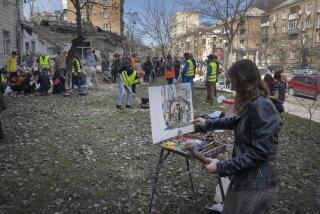Second bombing in Russia raises fears before Olympics
MOSCOW — At least 14 people were killed and 28 injured Monday in the second suspected suicide bombing in the southern Russian city of Volgograd in as many days, heightening concern about security at the upcoming Winter Olympic Games in Sochi.
Ten passengers were killed instantly when a bomb exploded Monday morning on a crowded trolley bus, and four more died on the way to and in hospitals, officials said.
Russian law enforcement agencies said the explosion was a terrorist attack and that they suspected a connection with a suicide bombing less than 19 hours earlier at Volgograd’s main railway station.
The death toll from Sunday’s attack was raised to 17, including the bomber, when a victim died overnight at a hospital, officials said. Seven other victims were flown to Moscow for treatment, media reports said.
No group has claimed responsibility for the attacks, the latest of several to hit southern Russia in recent months. Volgograd is close to the troubled Caucasus region, where Chechen rebel leader Doku Umarov has vowed to use “maximum force” to prevent Russia from staging the Olympics, which he called “satanic games held on the bones of our ancestors.”
Alexander Zhukov, head of the Russian Olympic Committee, said in televised remarks Monday that all necessary security measures have been taken to provide safety at the games in Sochi in February.
President Vladimir Putin dispatched Alexander Bortnikov, chief of the Federal Security Service, to oversee the investigation in Volgograd.
“I think we will be able to solve these crimes given that we have certain clues,” Bortnikov told the Itar-Tass news agency.
In Washington, National Security Council spokeswoman Caitlin Hayden said the United States had offered its “full support to the Russian government in security preparations for the Sochi Olympic Games.”
“We would welcome the opportunity for closer cooperation for the safety of the athletes, spectators, and other participants,” Hayden said in a statement.
Vladimir Markin, spokesman for the Russian Investigative Committee, told reporters that the explosive device used Monday was believed to have been detonated by a male suicide bomber, whose body fragments were recovered and sent for genetic testing. Investigators were also questioning passengers who survived the attack, he said.
“The fact that the damage-causing elements in both explosive devices are identical proves the investigation’s theory of interconnection between the two terrorist acts,” Markin said. “It is possible that [both bombs] could have been prepared in the same place.”
Investigators initially thought the attack at the railway station was carried out by a female bomber, but on Monday they reportedly concluded that the assailant was a man.
A search of the scene uncovered a finger with a hand grenade clip attached to it, which was found to belong to a Russian national identified as Pavel Pechenkin, a law enforcement source told the Interfax news agency. The man from the Mari El republic in central Russia was believed to have converted to radical Islam and joined an Islamist cell, the agency reported.
Monday’s attack took place near the Kachinsky market in downtown Volgograd and was powerful enough to shatter windows in nearby houses. Rossiya-24, a Russian television news network, carried dramatic images of the destroyed trolley bus, with its charred roof crumpled, its sides blown off and mangled debris strewn across the ground.
The injured included an 8-month-old boy whose identity couldn’t immediately be established, Russian Deputy Prime Minister Olga Golodets said. The boy’s parents were believed to have died in the explosion.
“The other problem is that two people are in extremely critical condition,” Golodets said in televised remarks. “We must master all our fortitude and power. ... We can’t afford to be made scared.”
On Monday afternoon, Volgograd residents saw Interior Ministry troops and Cossack units patrolling city streets alongside the local police. A police officer told the Los Angeles Times that the extraordinary measures were taken because a significant police contingent from the city had deployed to the Sochi region, about 400 miles away, to reinforce security ahead of the Olympics.
Viktor Neizvestny-Ravin, a 53-year-old Afghan war veteran, said he was also patrolling the streets of Volgograd with dozens of his fellow veterans.
“We are looking into every yard, every shop, every park,” he told The Times. “It should have been done earlier as it could have saved lives. … As the police of the entire country now are protecting Sochi, we could be very handy helping protect our people in Volgograd.”
The attacks have prompted talk among some lawmakers about reintroducing the death penalty, on which a moratorium was placed under the late President Boris Yeltsin.
“My consistent position is that for such crimes like terrorism, crimes against children which cause their death, the death penalty should be applied,” Irina Yarovaya, head of the security committee in parliament’ lower house, said in an interview with Rossiya-24.
In a televised address Monday, the leader of the Russian Orthodox Church, Patriarch Kirill, said the terrorists “were imprisoned by the dark force.”
“Any references to religion have nothing to do with what is happening now in Volgograd and what happened earlier in other places of our fatherland,” he said.
On Monday afternoon, some Volgograd residents began gathering in the downtown Alley of the Heroes to demand tougher controls on migrant workers and visitors from the troubled North Caucasus region.
“Over 200 people showed up for the rally, but police were there on the spot and immediately detained about 20 of the most active protesters,” Olga Makarycheva, a 54-year-old state employee who witnessed the scene, told The Times by telephone. “People in town are depressed. They don’t feel protected, and the curious sight of Cossacks patrolling the streets now is far from sufficient to restore their shattered feeling of safety.”
[For the record, 5:46 p.m. PST: An earlier version of this post incorrectly said that Sochi is about 600 miles from Volgograd. They are about 400 miles apart.]
More to Read
Start your day right
Sign up for Essential California for news, features and recommendations from the L.A. Times and beyond in your inbox six days a week.
You may occasionally receive promotional content from the Los Angeles Times.






